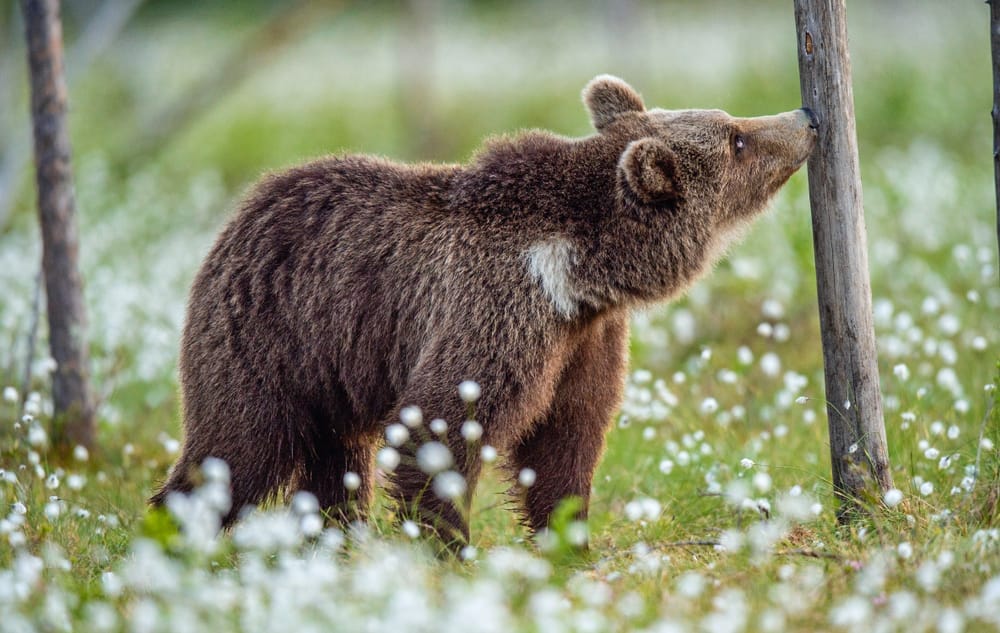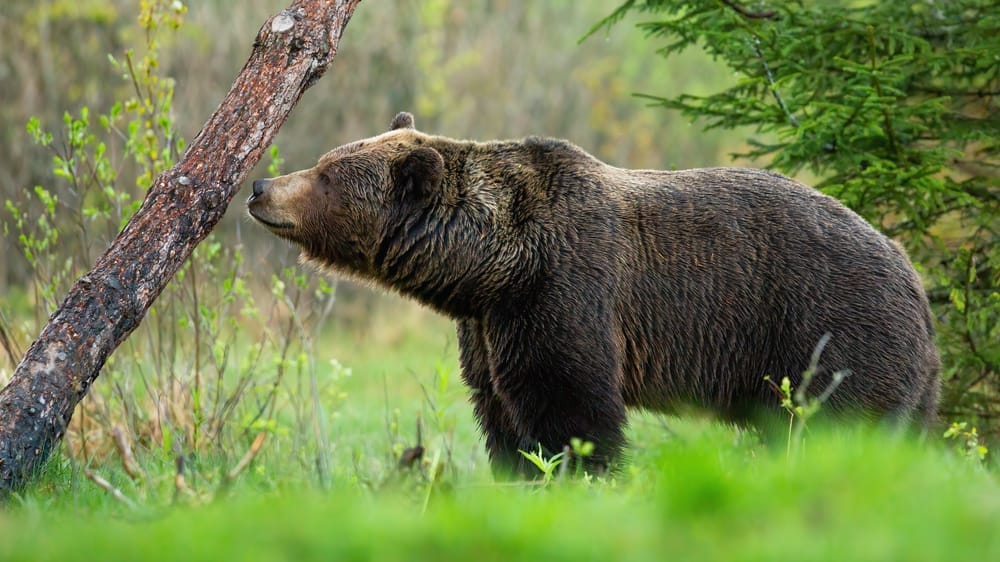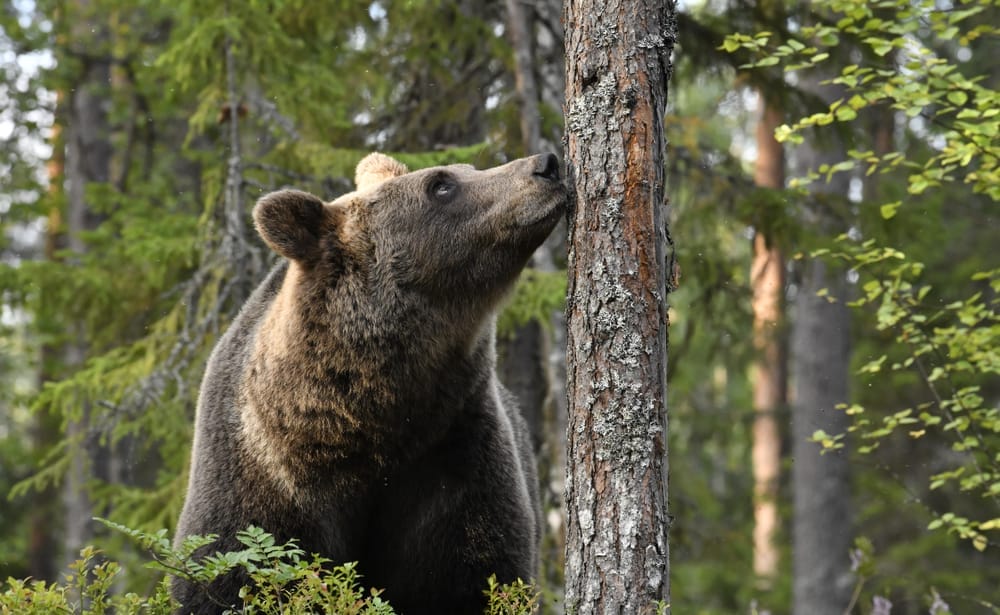
Bears are known for their exceptional sense of smell. In fact, their olfactory abilities are often considered the best among all animals on Earth. To put this into perspective, let's compare the sense of smell of bears to that of other animals.
The average dog's sense of smell is roughly 100 times better than that of a human. And a bloodhound, which is one of the best tracking dogs, is 300 times better. But a bear’s olfactory ability is 7 times better than a bloodhound’s.
Humans have a relatively poor sense of smell when compared to many animals. A bear's sense of smell is approximately 2,100 times better than that of a human.
Wolves and elks have a decent sense of smell, but bears outperform them both by a substantial margin. Bears can identify scents from greater distances and with higher precision.
Conservative estimates show that black bears can smell a food source from over a mile away. But other estimates have placed the black bear’s sense of smell between 18 and 20 miles and the polar bear’s at 40 miles. Other animals with a high number of smell receptors include African elephants, great white sharks, and cows.

The power of bear’s striking sense of smell lies in their complex and specialized nose structure. Bears have larger and more convoluted noses than humans. This means they have more nasal tissue, scent receptors, and a higher surface area available for detecting scents. The convoluted structure increases the likelihood that air passing through the nasal passages will come into contact with scent molecules.
Another key factor in the bear's olfactory prowess is the size of their brain's olfactory bulb, which processes scent information. Bears have a relatively large olfactory bulb compared to other animals, indicating that a significant portion of their brain is dedicated to processing smells. This amplifies their ability to analyze and remember a wide array of scents over time.

Bears, like many animals, have evolved with enhanced olfactory capabilities as a survival strategy. Over generations, those bears with a better sense of smell had an advantage in locating food and mates and detecting potential dangers, which increased their chances of survival and reproduction.
Bears are omnivores and have a diverse diet, including fruits, nuts, vegetation, insects, and, in some cases, meat. Their acute sense of smell allows them to detect the scent of potential food sources from great distances, even when the food is hidden or buried. This ability is particularly advantageous in seasons when food is scarce, as they can find nourishment efficiently.
Bears can use their sense of smell to locate prey, such as fish or small mammals. This helps them capture food with a higher protein content, which is essential for their survival, especially during hibernation preparation. Similarly, when they emerge from hibernation, their sense of smell helps them locate food sources that are essential for replenishing their body after a long period of fasting.
Bears utilize their sense of smell to locate potential mates during the breeding season. Their keen sense of smell helps them track down potential mates during the mating season, enabling successful reproduction.
Bears are not always at the top of the food chain, and they must be aware of potential threats from predators. Their ability to detect the scent of other animals, including humans, helps them avoid confrontations and stay safe.

The sense of smell influences bears’ behavior throughout different seasons, especially during key periods of mating season and hibernation. Seasonal changes affect smell and can trigger different behaviors.
For example, during hibernation, bears rely less on their sense of smell for hunting and foraging. Instead, they exhibit a unique behavior called "winter sleep." They enter a state of reduced metabolic activity, their heart rate drops, and they don't eat, drink, or eliminate waste. All this is essential for winter survival.
However, their sense of smell still plays a crucial role in sensing disturbances around their dens. If a potential threat, such as a predator or human, approaches the den, the bear's acute olfaction allows it to detect the danger.
Understanding the exceptional olfactory abilities of bears sheds light on their fascinating behavior and plays a pivotal role in effective conservation efforts and the prevention of human-bear conflicts.
Recognizing that bears rely on their sense of smell to locate food sources underscores the importance of preserving their natural habitats. Habitat destruction or fragmentation can disrupt their foraging habits and lead to food shortages, impacting bear populations. Conservation efforts should prioritize habitat restoration and protection.
The knowledge of how bears locate food allows for better management of food sources within bear habitats. This can include strategies like planting specific crops to attract bears away from human settlements or protecting key food resources like salmon runs.
When the people in bear country learn about bears’ extraordinary sense of smell, they can recognize the need for responsible behavior. This includes proper food storage, waste management, and respectful observation of bears from a safe distance.
It can also facilitate the implementation of bear-resistant food storage and waste management strategies in areas where humans and bears intersect and can prevent bears from becoming accustomed to human-associated food sources. This reduces the likelihood of bears seeking out human-related food, which often leads to conflicts.
Lastly, it encourages outdoor enthusiasts to follow ethical and responsible practices in bear habitats, which is essential. For example, they can minimize disturbances, keep a safe distance from bears, and avoid actions that could provoke a bear's natural defensive instincts.At Lions Tigers & Bears, we understand the numerous challenges that bears face, including habitat loss, human-bear conflicts, and the ever-present threats of environmental changes. That’s why advocacy and education are integral to our mission. Through your support, we can continue to raise awareness about the remarkable capabilities of bears and the essential role they play in our ecosystems.


Ph: 619.659.8078
Fx: 619.659.8841
[email protected]
24402 Martin Way, Alpine, CA 91901